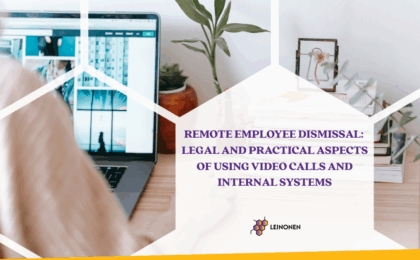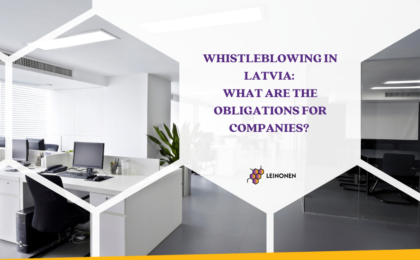From the 1st of August, massive changes have happened in Latvian labor law. While already Latvian labor law is one of the strictest in the EU in terms of Employee protection, the latest changes have amplified the protection that employees have been offered. This is also a historical change, embracing the protection of same-sex couple relations in the field of employment giving additional incentives for starting a family.
The main objective of the amendments to the Latvian Labour Law is to ensure that the requirements of Directive (EU) 2019/1152 of the European Parliament and of the Council of 20 June 2019 on transparent and predictable working conditions in the European Union and Directive (EU) 2019/1158 of 20 June 2019 on work-life balance for parents and carers are applied, as well as to ensure compliance with the Constitutional Court’s decision of 12 November 2020 in Case No. 2019-33-01 envisaging leave for the female partner of the child’s mother.
We have summarized the changes and separated them into thematic groups.
The probationary period for fixed-time employment
As it is known, employment agreements can be concluded for an unlimited time, that is, till the moment agreement is terminated either by both sides concluding an agreement on termination or by one of the sides giving an early notice. During the probation period, each side can terminate the employment relations with a notice within 3 days. Until now, the maximum allowed probation period has been 3 (three) months, which often leads to circumstances where a fixed time agreement was concluded for the same period, hence the employee had no job security in a fixed term agreement. While it was always encouraged to shorten the probation periods, this consideration has finally been recognized by law.
If the employment agreement is concluded for a fixed period, the probationary period will be reduced in the following cases:
- If a contract is concluded for up to 6 (six) months – the probationary period can be up to 1 month.
- If a contract is concluded for up to 1 (one) year – the probationary period can be up to 2 months.
Information to be included in the employment agreement (additions)
Often employees are still not familiar with their rights, especially regarding working time, their time of relaxation, and termination of the agreement. Analysing social media discussions and questions sent to employment protection institutions, it is often regarding the termination of an agreement and the allowed timeframe for such termination. Recognizing the fact that often the employment agreement and work regulations are the only sources of information regarding the rights that employees use, the scope of mandatory information in the employment agreement has been extended. Besides the current compulsory information within the employment agreement or internal regulation, the following information has to be specified:
- If an employee does not have a fixed place of work, then the employee is free to determine their place of work. This also helps the remote workers and minimizes the administrative steps to take if an employee changes their living space temporarily or permanently.
- Where part-time work is agreed and the working time is entirely or mostly unpredictable, that:
- the working time is variable by including information about the amount of agreed guaranteed paid working time within 1 (one) month,
- the time during which an employee can or should carry out the work,
- The length of the probationary period (maximum probation period for contracts concluded for an undefined period is 3 (three) months).*
- The employee’s right to training if such right is intended.
- The social security institutions receive the social security payments if the employer is responsible for social security protection (e.g. if the Employer pays the social tax, then the institution receiving the social tax has to be indicated).
- Information about the termination of the employment agreement (both regarding employee’s and employer’s notice).
*In a collective agreement, the parties will be able to agree on a probationary period of more than 3 (three) months but no more than 6 (six) months without reducing the overall level of protection of employees.
Where this information is replaced by a reference to the relevant articles in law and provisions in internal regulations or the collective agreement (if one is concluded), the employer must ensure that the information is available to the employees free of charge, is comprehensible, and complete and is easily accessible, including by electronic means, online portals, or information systems. For instance, if the employment agreement references Labour law articles, either a copy of Labour law must be available to the employees or a computer must be available, so employees can review their rights as referenced.
Employers will now be obliged to inform all employees of amendments to the collective agreement and the rules of procedure before they enter into force, but no later than on the day they enter into force.
Reference hours and work schedule
The amendments to the Labour Law define the working time as the exact time when an employee starts and finishes work. Reference hours and days are fixed days during which work may be performed at the request of the employer. (For instance, the classic office hours – 40 (forty) hours per week, working from 9-18, with an hour for lunch break have to be defined in the employment agreement).
Where the employee’s work schedule is unpredictable, the employee may be employed only if the work takes place during certain reference hours and days determined in advance and the employer has duly notified the employee of the exact time when the work shall be performed. If the employer fails to comply with this obligation, the employees will be entitled not to arrive at work but will be entitled to the remuneration they would have received if they had performed the work. (This case will be considered as a forced idle time).
Adjustments for working time for personal care
Employees who have a child under the age of 8 (eight) or need personal care for a spouse, child, close family member, person living in the same household as the employee and who, for a serious medical reason, need care or constant support, will have the right to ask the employer to adjust their working time. The employer is obliged to assess such a request within 1 (one) month. In such cases, the employee has the right to request the opportunity to work remotely.
Employers are now obliged to grant leave without pay if it is requested by an employee who needs to provide personal care for a person living in the same household and who requires substantial care or support. Such leave must be granted for a maximum of 5 (five) working days in any one year and may be taken in parts.
Parental leave
Partial parental leave cannot be shorter than 1 (one) calendar week. However, the employee will have the right to request flexible use of parental leave. Such request is assessed within 1 (one) month.
The child’s father will now be entitled to a 10-working day leave, which can be taken immediately after the child’s birth, but no later than 6 (six) months after the birth.
If the paternity of the child has not been established, the child’s father has passed or the custody rights are terminated, a person other than the child’s mother is entitled to a 10 (ten) working day leave. This leave will also be granted in the period immediately after birth till up to first 6 (six) months of the child’s life. These amendments ensure compliance with the Constitutional Court’s decision in Case No. 2019-33-01
Contracts concluded before the 31st of July 2022 must be amended to comply with the new regulations.
If you recognize changes that are not yet included in your employment agreements or work regulations or wish to further understand the amendments made to labor law, please feel free to reach out for a consultation.




